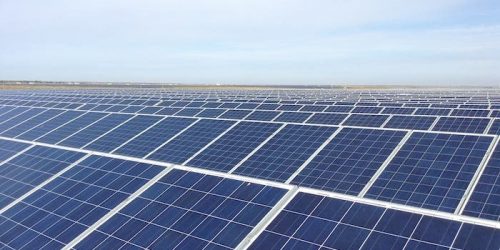India witnessed a new record-low solar power tariff in one of the recently concluded national level tenders. The new tariff bid is 3% lower than the previous record-low bid which was first discovered in 2017 and then twice in 2018.
The Solar Energy Corporation of India (SECI) bid out 2 gigawatts of solar power capacity late last month in an auction dominated by foreign project developers. Spanish, Italian, French, German, and British companies bagged sizeable shares in the tender while quoting aggressively low tariffs. The lowest tariff bid was submitted by Solarpack, a Spanish developer. The company submitted a bid to develop 300 megawatts of capacity at Rs 2.36 (US¢3.16) per kilowatt hour. The previous low in India’s solar power sector was Rs 2.44 (US¢3.27) per kilowatt hour. The tariff was quoted by Acme Cleantech in three different tenders.
Apart from Solarpack, the Indian subsidiaries of Enel Green Power, Eden Renewable, and ib vogt secured large capacities in the highly contested auction. Each of these companies had bid to develop 300 megawatts of capacity. Canada-based Amp Energy Group secured a 100-megawatt project. One of India’s largest renewable energy companies — ReNew Power — bid for 1,200 megawatts but could only manage to secure 400 megawatts. Solarpack and Enel Green Power issued press releases with details of project capacities and associated capital cost. The two companies are expected to invest over US$300 million to develop these projects.
Signs of a highly competitive auction were visible when interested developers submitted their initial capacity bids. Against an offered capacity of 2 gigawatts, 11 developers had committed to develop nearly 5.3 gigawatts of capacity. India’s largest power generation company, NTPC Limited, had submitted a bid to develop 1,180 megawatts. Some major companies that had initially expressed interest in the tender but either did not participate in the auction or failed to bag any capacity include O2 Power, Tata Power Renewables, Azure Power, and NTPC.
While Azure Power, Tata Power Renewables, and NTPC submitted bids in the initial round, they did not participate or manage to secure any capacity during the financial bidding round. A few other major developers stayed away from the tender entirely. Acme Cleantech, Hero Future Energies, and Adani Green Energy are some of the leading domestic developers that decided not to participate. Some of the Indian developers have been struggling financially for the last few years.





